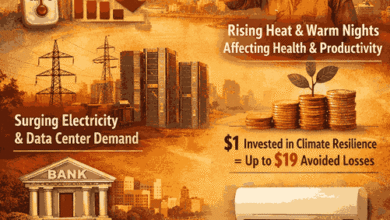For Each Degree Of Global Warming, Increase In Temperature Is More Pronounced For Arabian Peninsula
COP29 does not seem focused on rising global temperatures

It is well accepted that for each degree of global warming, the corresponding increase in regional temperatures is significantly more pronounced for the Arabian Peninsula, which has already warmed at a rate 50% higher than other landmasses in the northern hemisphere.Saudi Arabia is already witnessing the impacts of climate change within its local and regional environments.
Saudi Arabia, a country characterized by its vast deserts, unique geographical features, and rich cultural heritage, stands at the tip of a transformative challenge: adapting to the impacts of a rapidly changing climate. As global temperatures continue to rise Saudi Arabia is projected to experience more rapid changes in its climate patterns compared to other regions.
This not only intensifies climate-related risks across the country, but also profoundly impacts biodiversity, freshwater resources, agricultural productivity, industry and economy, and the health and wellbeing of its people. But Climate impacts are claiming lives fast there this year – with 1,300 dying at the Hajj alone as temperatures hit 50C in Mecca. According to the Climate Meter report Saudi heatwaves during that time period were 2.5C hotter due to climate change . Saudi Arabia has also experienced an increase in average temperatures, which has led to higher summer temperatures and more frequent and intense heat waves over the past four decades. According to ” Climate Futures -Saudi Arabia in 3 degree warmer world” a report recently published in KING ABDULLAH UNIVERSITY OF SCIENCE AND TECHNOLOGY (KAUST).
Addressing the cascading effects of a 3-degrees warmer world calls for a comprehensive approach that transcends individual sectors and borders. This includes robust mitigation strategies, adaptive measures, and international cooperation to manage shared risks and challenges. However It does not look as if there will be any meaningful outcome from COP29 according to experts. So far, COP29 does not seem focused on stopping rising global temperatures .
Speaking in London on 26 June, Azerbaijan’s lead negotiator Yalchin Rafiyev talked about a list of plans and goals for the meet (COP29), including a global ceasefire, youth empowerment, health, air pollution, sport, capacity building and a proper look at super pollutants. Yet there was no mention of Fossil fuels in his list or the COP28 ‘Consensus’ that charted a (rough) path for the end of coal. He is more focused to make COP to be a four-week global cessation of conflict, modelled on the Olympic Truce. However as hosts of COP29, Azerbaijan (with their lead negotiator Yalchin Rafiyev) will be a centre where the whole world can come together to engage in discussions on climate change and its Impacts and how to prevent rising temperatures.
Meanwhile Heat waves and periods of high humidity are projected to increase in frequency, straining the fundamental biological functions that regulate the human body. A concerning increase in heat-related stress and death has been observed in recent heat-wave events around the world, while the health risks associated with extreme temperatures are well documented, exacerbating existing conditions including cardiovascular and respiratory diseases, diabetes, kidney issues, and mental health concerns. The health risks associated with poor air quality driven by both climate and anthropogenic factors, are similarly concerning, as are the challenges associated with vector-borne and other diseases that risk being enhanced under future climate scenarios.
The writer of this article is Dr. Seema Javed, an environmentalist & a communications professional in the field of climate and energy




